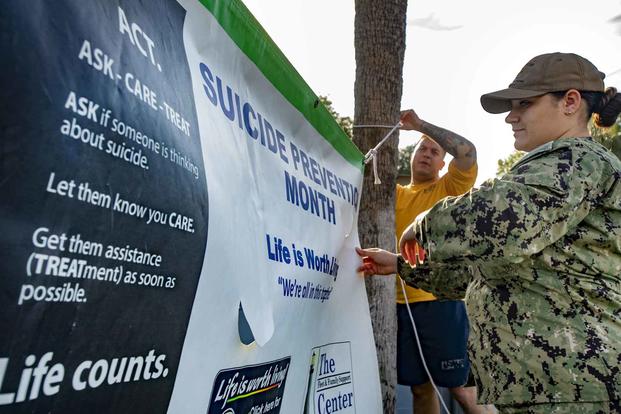The opinions expressed in this op-ed are those of the authors and do not necessarily reflect the views of Military.com. If you would like to submit your own commentary, please send your article to opinions@military.com for consideration.
This year as we honor those who have put on the uniform on Veterans Day, we must take the time to remember that, for many, their unwavering commitment and dedication to our democracy has come at a cost.
As our longest war in Afghanistan ended after two decades of near constant operations, our veterans, many of whom served multiple tours, are now coping with the physical and psychological aftermath of this service alone.
We have both experienced combat in Afghanistan and Iraq firsthand, and Daniel was twice wounded in action. However, suicide is far more dangerous to our service members and their families than combat.
Today, the Department of Veterans Affairs is experiencing a lengthy backlog due to an influx of benefits claims over the last several years in the wake of the PACT Act and as COVID-19 swept our nation. While the VA catches up, veterans lack the transitional support they need to reintegrate successfully -- and some are losing the battle. Every day, about 17 veterans take their own lives, and still more fall through the cracks. To provide the veterans community with the mental health and suicide support they need, we must ensure we understand the gravity of the situation.
Specific, transparent information about veterans' mental and physical wellness is the only way to ensure we see the full scope of the issue. We need a whole-of-government effort to prevent suicide, with no policy "stone" left unturned. Together, we can do better to make sure every veteran has the support they need to thrive.
In recent years, the VA has made great strides following legislation that expanded health benefits. Congress has passed bipartisan legislation such as the MISSION and PACT Acts, which are specifically designed to strengthen the VA health care system nationwide. However, even minor data and technical issues can have an outsized impact on veteran statistics and assessments, resulting in delays and red tape -- the cracks through which veterans fall.
For instance, 32,000 veterans had a VA disability claim delayed by a technical issue. This affects the overall accuracy of VA statistics and sometimes delays care to the point of tragedy. Although legislation and federal support help equip the VA with the tools to mitigate them, these issues are bound to happen from time to time. To ensure veterans are supported no matter what happens will require a holistic approach to care that begins at the community level.
Holistic support will also help encourage more struggling veterans to access care by normalizing mental health issues and providing transparent avenues to help. In 2020, approximately 5.2 million veterans experienced a behavioral health condition. But more than half of veterans with a mental illness did not receive treatment within the past year. Additionally, more than 90% of those experiencing a substance use disorder did not receive treatment.
Many of these veterans don't know what resources are available to them or may feel a stigma about needing mental health support.
While the conversation and advocacy around veteran suicide and mental health issues has progressed, holistic care -- with the investment of the VA, federal and state lawmakers, and individuals within communities -- will help ensure that that numbers around veteran suicide start to fall.
One success story that we've had the fortune to witness firsthand is within Virginia's Department of Veterans Services, or DVS. It is partnering with nonprofit veterans organizations such as America's Warrior Partnership to bolster its abilities to adequately address veteran needs. The Virginia DVS is also committed to understanding and minimizing suicide and substance abuse through a reduction grant program that helps community partners identify, screen and refer veterans to lifesaving resources. Transitioning service members face unique challenges, and this serves as a case study for what is possible when the community bands together to help our veterans.
Many of us in the veteran community have lost fellow service members and dear friends to suicide. Words fail to encompass the depth of these losses. But this is exactly why we must help prevent future tragedies and support veterans at risk. As veteran suicides and premature deaths persist, communities need a clear framework for assessment measures and mitigation moving forward so we can fully support veterans in their post-service journey.
-- Jim Lorraine is the president and CEO of America's Warrior Partnership, a national nonpartisan veterans' nonprofit. He retired as the deputy command surgeon for the United States Special Operations Command after 22 years of service in the U.S. Air Force as a flight nurse with nine combat deployments.
-- Daniel Gade currently serves as the commissioner of the Department of Veterans Services for Virginia. He is a West Point graduate who served in the U.S. Army for 25 years, including deployment to Iraq. He was wounded in combat twice and lost his entire right leg.











